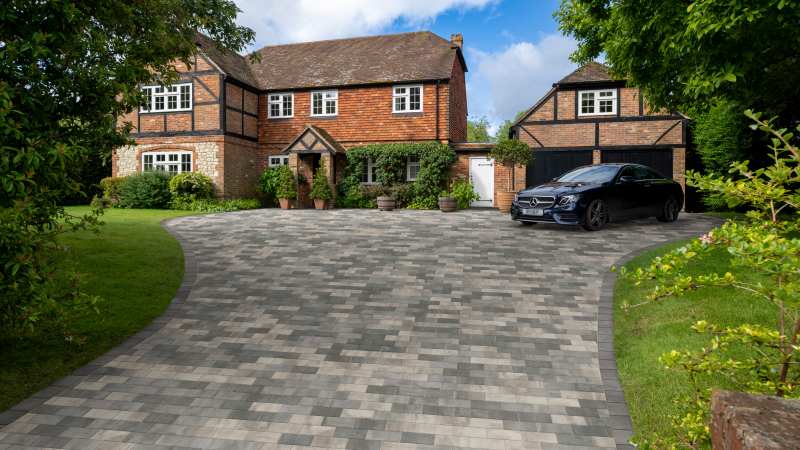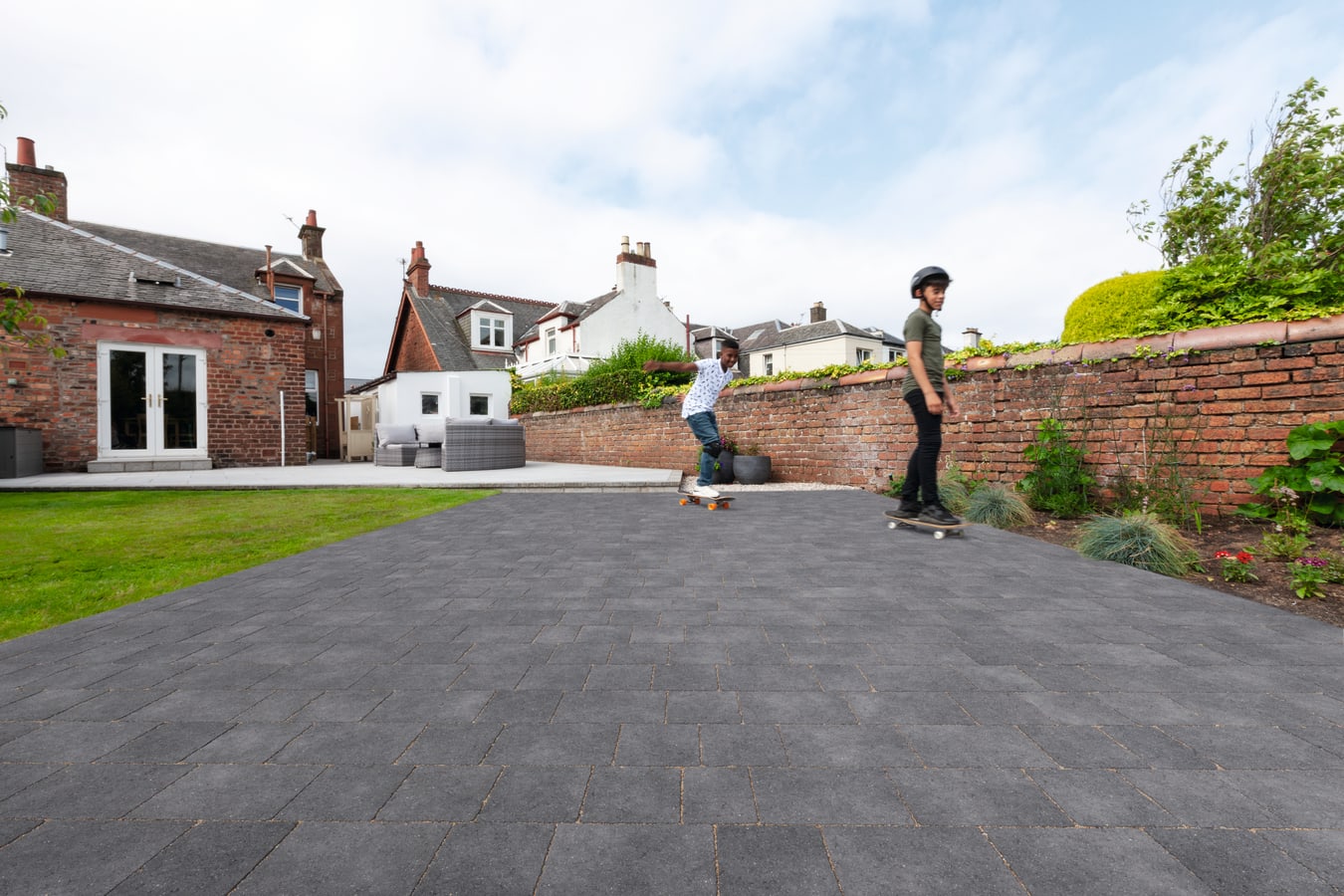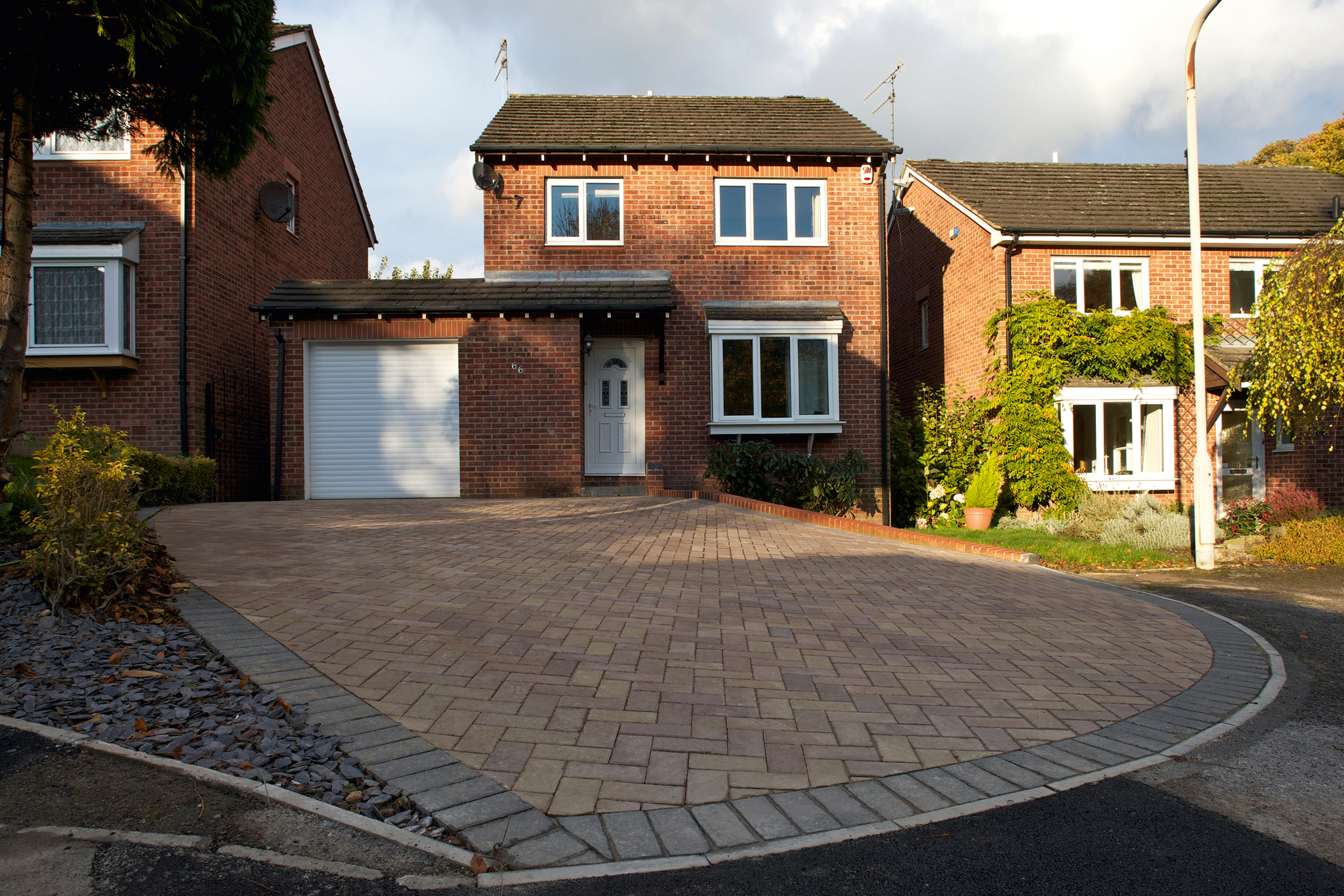Blog
A new driveway is a big investment, not just in financial terms. It's something you'll see every day, and it makes a first impression on guests and potential buyers.
So, we've put together this guide to shed some light on all things driveways.
Here, we explore how much a driveway costs, the factors that affect the price, and what you need to consider before you replace your current drive.

How much does the average driveway cost?
When it comes to driveways, 80% of the cost is made up of the bits you don't see – the sub-base, ground preparation and help from a professional, and only 20% on paving or other materials. The level of work needed to prepare the ground, the materials you choose and the complexity of any laying patterns or designs will all affect the quote.
To get an accurate idea of how much your driveway will cost, you will need to arrange for a professional to come out and take a look. We'd recommend getting at least two quotes to compare.
According to information from Checkatrade, the average costs for different materials are:
- Asphalt driveway - £80-£112 per square metre
- Concrete – £75-£85 per square metre
- Gravel – £50-£70 per square metre
- Resin – £110-£180 per square metre
How much does driveway block paving cost?
Block paving offers many colour and shape options and is a cost-effective way to create an attractive, hard-wearing driveway.
A popular choice is our Drivesett Tegula paving, which is approximately £40 per square metre. Based on a driveway of 60 square metres, this would cost £2,400.
Meanwhile, classically understated Keyblok 60 block paving is approximately £24 per square metre, or £1,440 for a 60 square metre driveway.
Marshalls' block paving also comes in circle designs, so you can get creative and turn your driveway into a statement piece.
To see how much a block paving driveway would cost, find out the size of the driveway you want to pave and calculate the price on our website. Each block paving product page includes a price per square metre, and you can see the surface area each pack will cover.
As we explore below, several factors will affect the cost of a new driveway. You should call a professional and ask for a quote for an accurate estimate. This way, they can properly assess the job's size, scale, and complexities.
Before you choose someone to lay your new drive, we recommend getting quotes from a couple of people so you can be confident you're getting a reasonable deal.
What factors affect the cost of a new driveway?
-
Materials: Whether you choose a block paving, concrete, resin, gravel or tarmac driveway will affect the cost of your driveway. Gravel driveways are usually more cost-effective, while resin surfaces are more expensive than tarmac or block paving.
- Other features: this can make the installation process more time-consuming and increase costs. If you want additional equipment fitted alongside your new driveway, e.g. bollards, edging or lighting.
- Complexity and size of the driveway: Your driveway's size, shape, and terrain can impact costs. For example, installing an uneven driveway or one on a slope will be more expensive than installing it on a flat surface.
- Groundworks: Complex groundwork that involves levelling, excavating or reinforcing the surface will prolong the installation process and increase costs.
- Labour costs: The person you hire to do the work and their level of expertise will affect costs. We recommend choosing a professional with good experience to ensure your driveway is properly installed and treated.

Benefits of a new driveway
The most obvious benefit to getting a new driveway is the increased kerb appeal. A well-laid drive is an excellent welcome home and creates a great first impression for visitors or potential buyers.
As well as making your home look more inviting, there are other benefits to having a new driveway, including:
- Increased property value: Checkatrade estimates that a new drive can add 5-10% to your property's value.
- Improved safety: As your existing driveway ages, cracks and holes can become tripping hazards, especially with children about. A new driveway reduces this risk. Compared to parking on the road, parking on a driveway minimises the risk of collisions and makes getting the kids in and out of the far much easier.
- Lower maintenance: driveway maintenance costs can be steep, especially if professionals haven't installed your current drive. Properly installed driveways can last 10-15 years with minimal attention.
What to consider before replacing your existing driveway
Before you start digging up your current driveway, you need to make a couple of decisions regarding the material and who will install the driveway. These choices will affect how long your driveway lasts and how much it costs.
Do you do it yourself or get a professional?
Before deciding whether to call in the professionals or do the work yourself, consider the extent of the changes you want to make. If you want a completely new surface, we recommend using professional driveway installers with experience excavating and preparing the ground and installing drainage and the driveway itself.
Like any property project, if you're not entirely sure what you're doing, you may find the savings you make doing the work yourself are swallowed by maintenance and repair costs.
Not sure who to use? Use Marshalls' network of approved driveway installers.
What driveway materials will you use?
Choosing a driveway material can be difficult, especially with so many options available. To help you, here's a rundown of the five most durable driveway materials.
Concrete driveways
A concrete driveway is a low-maintenance optionalthough it may not be visually striking, concrete can be a stylish choice if you are trying to achieve an industrial aesthetic. Although there can be issues when it comes to drainage and standing water.
Gravel driveways
Gravel is a convenient choice if you're on a budget and want a replacement driveway installed quickly.
While gravel driveways can be messy and require lots of maintenance to remove weeds and dirt, there are lots of colour and style options available. The sound of the stones underfoot can also deter thieves; it's hard to act sneaky when every step you take crunches.
Tarmac driveways
A tarmac or asphalt driveway can be expensive but has excellent longevity and gives homes a sleek, understated finish. Like concrete, there can be issues when it comes to drainage and standing water.
Block paving driveways
Block paving has become more popular as it lets homeowners turn their driveways into features.
A block paving driveway creates a hard-wearing surface, and individual blocks can be replaced if they become damaged, reducing maintenance costs.
Concrete block paving is the most popular choice for driveways. It is loved for its affordability and hard-wearing, attractive finish. Keep reading to see how much block paving costs.
Resin driveways
Although installing a resin driveway can be expensive, it provides a hard-wearing surface and is available in different colours and styles to complement your home.
Like other driveway materials, resin is low maintenance and stands the test of time.
Remember: You should always order samples of the materials you like before you buy.
And, ask your installer to see the driveways they have completed using the same paving so you can take a look.

Driveway tips from professional installers
We asked some paving installers to share the tips and advice they give to their customers when it comes to planning a new driveway… here's what they said:
"Using a reputable contractor that can offer a valid guarantee is a good place to start, then move onto block choice and requirements/ desires of how you would like to drive to look and perform." Paddy Moyna, The Driveway Specialists.
"The most important thing in planning a driveway is sub base and drainage." Matt Curran, 4 Life Landscapes.
"Choose a contractor you are happy to work with at home that can guarantee a clean and tidy job. Listen to the contractor's ideas on the design of the driveway and take the parts that you like, and remember the top surface is only a small part of the overall cost, so go with what you like." James Kennedy, The Reigate Paving Company.
"Be sure to get more than one quote and do your research when choosing a contractor. Look for reviews online, but word of mouth is usually the most effective.
"Ask to view the contractors' recent work. Only accept quotes in writing, not verbal, and ensure you sign a contract so everything is black and white. Where possible, try to choose contractors who are members of the Marshalls Register to ensure their work is frequently inspected and that the contractor has adequate insurance cover." Paul Taylor, Preston Paving and Landscaping Ltd.
"Do your research into the installers; don't rush into a project. Be prepared to wait as long as it takes for them, or more often than not, you will end up regretting it! You only want to do the job once!" Chris Johnson, CJ Paving.
"We always say it like building a house; if the groundworks are wrong, it won't last no matter what you do." Richard Box, English Landscapes.
"Regarding block choice, consider whether the drive is north—or south-facing and what level of maintenance you want for the block against your budget.
"Ask for samples, but if you can, ask your contractor if you can go and see another drive of that block they have laid. In my opinion, Samples don't always represent the overall characteristics of a product when laid in volume." Joe Cheetham, Zenscape.
Choose Marshalls for your next driveway
Your driveway is more than just a place to park your car. It's an opportunity to make an excellent first impression and a statement.
Explore our driveway pavers, paving and stone to find a comprehensive range of colours, styles and finishes that achieve a long-lasting, premium look.
Still figuring out what you want? See what our products look like in situ with driveway images to inspire your choice.










